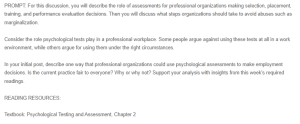Discussion – Assessments in Professional Organizations
The person-in-environment perspective identifies that personal issues and needs not only arise from the individual and the environment but also from the interaction between these two; therefore, personal problems symbolize a mismatch between the individual and their environment (Daley, 2019). In rural settings, individuals are deeply enmeshed in their environment; therefore, incorporating the person-in-environment perspective is crucial to social work assessments and interventions. Notably, social relationships may lead to problems, solutions, or uncertainties (Daley, 2019); thus, understanding a client’s social relationships is significant in effectively assessing the problem(s) and implementing appropriate change strategies. Besides, failure to assess these social relationships may result in situations where a social worker is thought to take sides, resulting in animosity toward the social worker, which, in turn, affects the client. Overall, the person-in-environment perspective is important, as it provides rural social workers with a strong framework for assessing the nature of a client’s social relationships.
Challenges that social workers encounter in the 21st century revolve around social justice, economic justice, and environmental justice. Social justice issues encompass discrimination, including stereotypes, social exclusion, derogatory labels, political exclusion, and denial of health care and education (Daley, 2019). Second, issues concerning economic justice include unemployment and wage inequalities, where some individuals may receive lower salaries compared to their counterparts. Third, issues in environmental justice include climate change, pollution, and environmental disasters, such as earthquakes, tsunamis, and floods.
To address these challenges, one potential solution is engaging in collaborative efforts with community leaders and various organizations. Notably, working with community leaders and members would be crucial in addressing problems from their roots and, thus, implementing appropriate interventions. Additionally, partnering with concerned organizations would help pool resources to cater to the needs of marginalized communities, such as healthcare and education. Second, social workers could participate in policymaking and become advocates for identified communities so as to prevent or stop discrimination of any form. Lastly, promoting inclusive education and training is crucial. This would equip social workers with the necessary skills like cultural competency, ensuring that social workers can better relate to and serve diverse clients.
References
Daley, M. R. (2019). Rural social work in the 21st century: Serving individuals, families, and communities in the countryside (2nd ed.). Oxford University Press Academic US. https://bookshelf.vitalsource.com/books/9780190937690
ORDER A PLAGIARISM-FREE PAPER HERE
We’ll write everything from scratch
Question
PROMPT: For this discussion, you will describe the role of assessments for professional organizations making selection, placement, training, and performance evaluation decisions. Then you will discuss what steps organizations should take to avoid abuses such as marginalization.

Assessments in Professional Organizations
Consider the role psychological tests play in a professional workplace. Some people argue against using these tests at all in a work environment, while others argue for using them under the right circumstances.
In your initial post, describe one way that professional organizations could use psychological assessments to make employment decisions. Is the current practice fair to everyone? Why or why not? Support your analysis with insights from this week’s required readings.
READING RESOURCES:
Textbook: Psychological Testing and Assessment, Chapter 2

